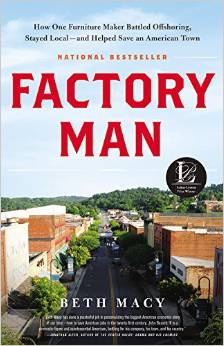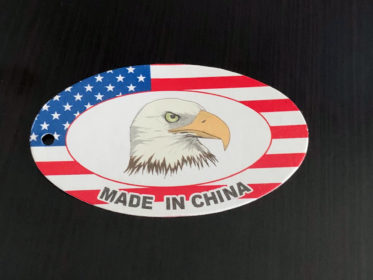 From 2001 to 2009, the U.S. realized a precipitous decline of manufacturing with the closure of 42,400 factories, including 36 percent of factories that employed 1,000 or more people and 38 percent that employed 500 to 999 workers, writes Richard McCormick in “The Plight of the American Manufacturer.”
From 2001 to 2009, the U.S. realized a precipitous decline of manufacturing with the closure of 42,400 factories, including 36 percent of factories that employed 1,000 or more people and 38 percent that employed 500 to 999 workers, writes Richard McCormick in “The Plight of the American Manufacturer.”
With these closures, entire industries moved to other countries, including electronics, circuit boards, steel, clothing, luggage, home goods and furniture. Today you’re hard-pressed to find a phone or flat screen TV made in America.
“The financial collapse that shocked the country in 2008 was long ago predicted by manufacturers,” writes McCormick. He cites Ernest Preeg, a senior fellow at the Manufacturers Alliance/MAPI in Washington D.C., who wrote in 2006 that “the trade imbalance was ‘like a gallows’ hanging over the American economy and that ‘sooner rather than later’ the markets will trigger the inevitable adjustment, with what will almost certainly be more grim financial reaping.”
This grim financial reaping was the 2008 financial collapse — due in part to the U.S. losing so many manufacturing jobs and with it, job stability and wages for millions of Americans.
The furniture industry in particular, according to McCormick, lost at least 60 percent of its production capacity in the U.S. from 2000 to 2008 with the closure of 270 major factories. Imports of wood furniture accounted for almost 70 percent of the U.S. market — up from 38% in 2000.
Factory Man: How One Furniture Maker Battled Offshoring, Stayed Local — and Helped Save an American Town is the story of Bassett Furniture in Bassett, Virginia and its rise from a small, family-owned business to its heyday as one of the largest furniture companies in the U.S. to its subsequent fall to importer.
Beth Macy doesn’t hold her punches or whitewash the truth. Factory Man is neither a romance about manufacturing nor is it an indictment against the paternalism that family-owned manufacturing companies sometimes engender.
Instead, it’s a story that brings to sharp relief the real life story of a family and its warts but also its inherent good. In her research, Macy came across many unsettling truths about life in America at the turn of century, the relationship between factory owners and workers, and indeed, racism. At times, Factory Man is an uncomfortable read.
But, Macy also shows us the triumph of one man and his vision “to change people’s minds abut manufacturing in this country.” It’s the story of John D. Bassett III, a brash, out-spoken third-generation “good ole’ boy” who began to question why furniture could no longer be made in America. Factory Man is the story of how he used smarts, cunning, his ever present legal pad, connections, federal law and good old American ingenuity to change things.
It’s the story of how he saved the Vaughn-Bassett furniture plant from the wrecking ball. It’s the story of how manufacturing is vital to this country, not simply in terms of jobs, but in terms of creating wealth, stability, and dignity across all levels of society. It’s your story and mine. Once you read it, you’ll begin to reassess cheaply made, imported goods and the detriment they’re causing to our society.
The answer to many of our economic woes, you’ll soon realize, isn’t that we in the U.S. need to spend more on “stuff.” The answer is that we need to bring manufacturing back to our country — before it’s too late.
Citations
The article, “The Plight of American Manufacturing,” can be found in the book, Manufacturing a Better Future for America, Edited by Richard McCormick, Alliance for Manufacturing, 2009. The statics quoted at the beginning of this post came from a different version of the same article at The American Prospect website.
“Still making it in America” by Beth Macy, The Roanoke Times, February 12, 2012 (This is Macy’s original piece about John D. Bassett III)
American Certified — A website where you can find Made in America products, from luggage and clothing to beauty items and furniture.




